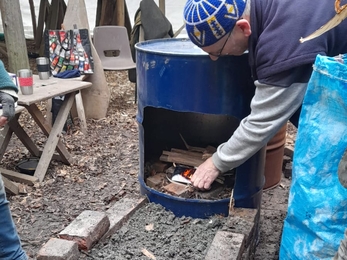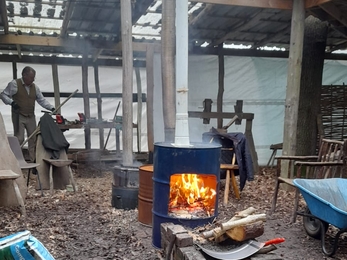Weekly wild news from our reserves - 11 March 2022
Withy bed management at Oulton Marshes – Lewis Yates
The Saturday morning volunteer work party at Lound Lakes was pleasantly interrupted by two majestic red deer stags appearing remarkably close by. These two impressive animals, the UK's largest land mammal, slowly made their way across the reserve, being enjoyed by a number of visitors.
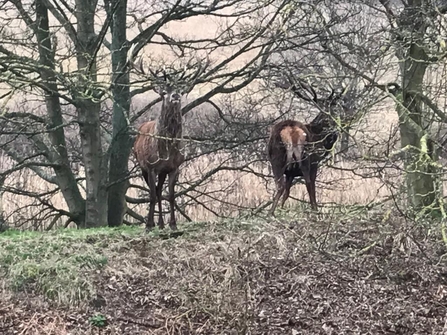
Red deer stags at Lound Lakes – Andrew Hickinbotham
Crunchy fish dinner
This week we caught some wonderful footage of an otter feasting on a rather crunchy fish at Carlton Marshes!
Yellowhammer rehearsing
In summer, yellowhammers are often seen perched on top of bushes singing their 'a little bit of bread and no cheese' song. In early spring you can hear them practicing the song, but as their larynx is not developed well enough to pronounce the challenging last two notes ‘no cheese’ they tend to miss those notes or tail off, like this one heard at Church Farm this week.
Yellowhammer underwent a 54% population decline between 1970 and 2015. They are a red listed bird of conservation concern in the UK. A bunting, eating seeds and insects and present year-round, flocking with other birds in winter, yellowhammer are struggling with many aspects of survival. The removal and over-management of hedgerows has reduced their nesting habitat; dense ground level cover and tussocky grasses. The efficiency of modern farming machines and the loss of winter stubbles in modern farming systems has removed much of their winter food; reducing health and condition when going into the breeding season and reducing breeding success.
Through our work on nature reserves and on farmland in Suffolk, we are improving the fortunes of the yellowhammer, by providing well-managed hedgerows for breeding and encouraging the provision of wild bird crops for winter food.
Yellow brain or witches’ butter
Tremella mesenterica, also known as yellow brain or witches’ butter fungus, is a parasitic fungus living on other fungi on this dead oak branch at Knettishall Heath.
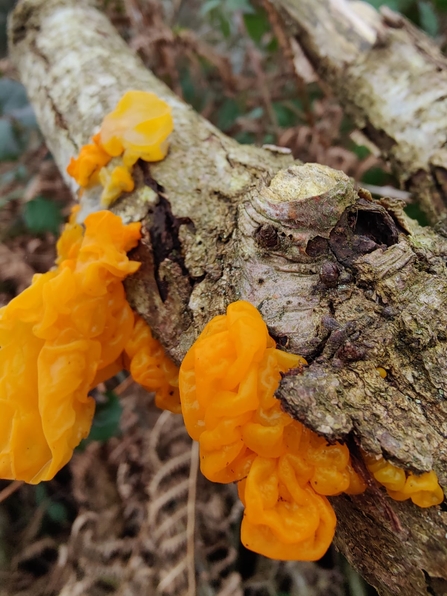
Yellow brain fungus at Knettishall Heath – David Stansfeld
Warm woodworkers
The woodworking group at Bradfield Woods built a new woodburner and repaired the back wall of the area which had been damaged by recent storms. It certainly looks cosy and inviting! Search events at Bradfield Woods if you would like to try a traditional woodworking craft https://www.suffolkwildlifetrust.org/events
Crafted Green Team
Our Green Team with Crafted really got stuck in at Oulton Marshes this week. It may appear that they made a field of coat hooks, but really this was the final cutting phase of rejuvenating the withy beds on the reserve. Come summer this area will perfect habitat for many bird species, and our Wildlearning Team will make use of the cut willow for wild crafts.
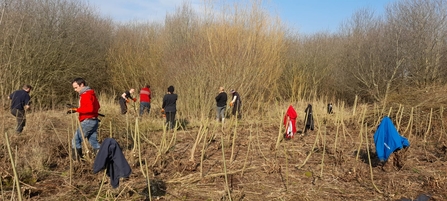
Withy bed management at Oulton Marshes – Lewis Yates
River wall breach ready for repair
Our brilliant volunteers cleared and burnt scrub from the river wall breach at Carlton Marshes this week in preparation for the wall repair works.
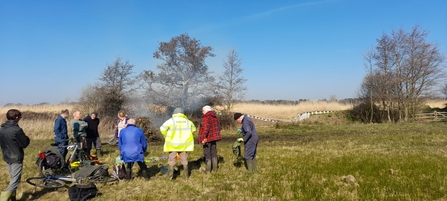
Volunteer work party at Carlton Marshes – Gavin Durrant
There’s a hole in my bucket
Warden Andy had an unexpected hindrance when the flail mower got blocked by this old bucket concealed in a bramble thicket, which had likely been discarded there many years ago. This highlights the problem of plastic pollution, particularly what a tough and persistent a material it is.
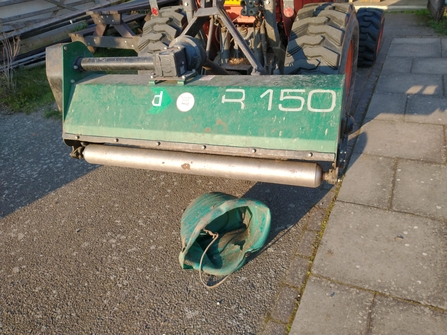
Flail mower issue – Andrew Hickinbotham
Spring springs forth
We have been seeing and hearing uplifting signs of spring across our reserves. At Lound Lakes Warden Andy heard a chiff chaff and spotted a red admiral butterfly whilst managing bracken beside the lake. Plum is in blossom at Knettishall Heath, which will provide an essential nectar source for insects. And at Foxburrow Farm visitors have been enjoying the sunshine, blossom and early leaves emerging.


